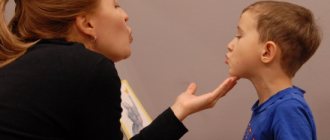- November 21, 2018
- Child psychology
- Artem Minasov
All parents look forward to the moment when their children begin to understand what they are being told. Speech proficiency is the most important task that the baby has to solve. To cope with this, you need to begin to perceive individual words, pronounce them and combine them into phrases. And parents are obliged to help their baby. It’s not easy, but the first cherished words “mom” and “dad” will bring so many emotions.
When children start talking: first attempts
It is almost impossible to say exactly when a child begins to understand what is being said to him. All children begin to develop speech and word recognition at different times. Some begin to speak earlier, others much later; in any case, the baby will not do it right away. First, the child will remember sounds and words and try to perceive them. Later the baby will start to walk. After six months of life, the humming will be replaced by babbling. The child will make attempts to pronounce the simplest syllables - “ma”, “ba”, “da”. And he will begin to understand words. These words are very simple, and they do not have a stressed syllable. As a rule, children try to name the most important things and actions.
For example, if a mother constantly names objects to her child, then he will answer the next question: “Where is the door?” – will turn his head in her direction. The baby will also try to joyfully copy adults in their actions: he will try to drink from a cup, and often has fun when he feels that he is understood.
Booming
The humming occurs around 1-2 months and lasts for about six months. As a rule, these are different variants of sounds: gee-s, agu-u, ge-e, agy-s, etc. Gradually, the baby’s “lexicon” is enriched with new intonations and sounds, the humming becomes meaningful and more active when people appear next to him , with whom you can “chat”.
If you look closely, you will notice that a child aged 3-4 months looks into your eyes while walking, as if trying to build a full-fledged dialogue. He learns to coordinate his voice and gaze, which in the future will become the basis of any contact with people.
Be sure to respond to your child and encourage his first “performances.” Look how he reaches out and tries to purse his tiny lips the way you do in order to give you a decent answer!
Yes, your little speaker is already imitating you and listening to what sounds he makes in order to repeat them most accurately. But for now, what is important for the baby is not the meaning of the words, but the rhythm of speech, the articulation of sounds, and various intonations. He studies all this intensively.
The baby is trying to say: how to behave?
The first time conscious words are heard from a baby is from 8 to 12 months. This is usually the period when the child begins to understand adults. He tries to turn to mom or dad, and sometimes asks for an item. Parents, as a rule, are incredibly happy, believing that their child is finally starting to speak. However, statistics show that speaking words for a long time does not carry any semantic meaning.
At what age does a child begin to understand?
All children are different. You can find many tables that describe what children can do at a given age. However, each child has his own individual parameters. Despite this, parents should definitely study the information on how the child’s age corresponds to his speech development:
- 1–3 months - the child screams, cries loudly, tries to repeat simple sounds - “a-a”, “a-gu”, “a-wu”.
- 4–5 months – the baby laughs, squeals, and makes drawn-out sounds with different intonations and emotions.
- 6 months - the baby recognizes the voices of his parents, tries to babble, makes sounds a little like “ma”, “pa”.
- 7–8 months – the child perceives words and simple requests (give, take). This is exactly the age when a child begins to understand the word “no” and imitates the bark of a dog or the sounds made by other animals. At 8 months, the baby remembers the names of some objects, but still cannot pronounce them.
- 9–11 months - the baby learns to speak simple words - “mom”, “dad”, “na”, “give”. His vocabulary contains no more than 10 words.
- 1–1.5 years – the child knows how to form word combinations, knows what some animals and people look like, and can identify them from illustrations.
- 2–3 years – children understand and learn to ask questions, know different concepts, carry out simple tasks, make sentences, learn and tell fairy tales and poems.
- 3–4 years old - the child already talks not only with mom and dad, but also with relatives and sometimes with unfamiliar children.
According to long-term statistics, the first word of most children is “mama” or “dai.”
Becoming Conscious Speech
The pronunciation of these words may not be perfect, but it is recognizable. In addition, the baby speaks in certain situations: the word “mom” is pronounced when she enters or leaves the room. If a baby points, for example, at a cat, saying “kitty,” it is important for parents to confirm that it is a cat, and then check with him where it is. If a child points to an animal, it means that he is beginning to understand. Later, the child will be able to answer certain questions not with a simple hum, but with a specific word.
Even if the child does not speak, this is not yet a reason to panic. Most likely, he will quickly catch up with the norm. After a year of life, the baby rapidly fills its vocabulary. Thus, without yet uttering the name of a certain object, he understands what the adult is talking about. The baby begins to fulfill simple requests, for example, he can bring a ball or a toy, and also often resorts to a pointing gesture, which is accompanied by a demanding intonation. This indicates that a stage is gradually approaching when the child begins to understand what is being said to him.
Unlike animals, humans have a second signaling system. This means that the human brain can react not only to sounds, but also to establish connections between them and objects (actions), to words that replace these sounds.
How children hear the words of adults
From early childhood, children react in one way or another to the words of others. For example, if you accompany an action with a certain word, a nine-month-old child will “learn” it. For example, with the phrase “give me a cube”, he will perform the corresponding action if the adult previously made the same movement, pronouncing exactly these words. At this age, children associate words only with a very specific object. If the cube turns out to be a different color or size, the child will not take it, because he does not associate the word “cube” with cubic-shaped objects in general.
At 12 - 18 months
Closer to one year, if the baby is properly raised and developed, characteristic stimuli of the second signaling system appear:
- generalization;
- abstraction.
The child begins to understand that the same word can denote objects that are different in shape, size and color, but have the same purpose. That is, if the mother asks to see a kitty, the baby will point to a pet, a picture of a cat, and a plush toy. For him, the word will already be detached from a strictly specific subject (distraction), and will designate it generally on the basis of the most important features (generalization).
This indicates that the second alarm system has begun to operate. The foundation for it is the first signaling system, significant sensory experience, and the stock of verbal symbols that the child accumulated in the first year of life. The more impressions he receives, the better this process goes.
From 1.5 to 2 years
At this age, sensory speech actively develops. The voice and speech of an adult in general are a strong irritant for the baby from the first days of life and mainly evoke pleasant impressions in him. Talking tenderly to the child, the mother feeds him, changes him, and calms him down. Growing up, children enjoy the fact that their parents play and communicate with them.
Up to two years of age, an adult’s speech helps a child navigate. When parents pronounce their actions, the baby’s interest in them increases, he concentrates better, and more and more sounds and their combinations acquire meaning for him, and his vocabulary expands. As a result, he experiences more satisfaction from communicating with adults.
As you can see, for a long time, almost up to 1 year, the child is generally indifferent to the meaning of the word. Then, at 10-12 months, as the brain structures mature, when the baby has accumulated a lot of sensory experience, he confidently reacts to a familiar word, regardless of the context of the situation.
The more different connections he has established between an object (action) and a word, the sooner he remembers it. Experts recommend letting the child touch everything with his hands and perform this or that movement himself, since tactile connections are formed faster. If a child simply hears a word or sees a named object in the hands of an adult, connections are established more slowly.
How does a child under 1 year old understand adult speech?
During the first year of life, the child develops important prerequisites and conditions for speech, although it has not yet been mastered. This period is called preverbal.
- The child learns to understand speech, that is, speech hearing and passive speech develop.
- The baby learns to pronounce individual sounds and their combinations. Speech vocalization develops, which is a precursor to one’s own active speech.
From birth, children have a special attitude towards the sounds of adults’ speech; usually, addressed speech causes a response of revival. At 3-5 months, they distinguish between speech sounds and sounds made by objects (toys, musical instruments). After 6 months, babies can already differentiate the speech sounds themselves by their timbre and tonality. This is a very important point, since these two components carry a certain semantic load.
The most important condition for mastering speech as a means of human communication is developed phonemic hearing. Thanks to it, the brain distinguishes the subtlest shades of sounds and phonemes, which is especially important if a change in a sound unit affects the meaning of the word (for example, “poppy - cancer”). Its active development occurs in the period of 6-12 months. By his first birthday, the child begins to distinguish many words from the speech of adults, understanding their meaning.
- For example, at 6-7 months, when naming an object, a baby can look for it, turning his head in the direction where the thing is located.
- After a month, he is able to find an object when named anywhere. In addition, at the request of an adult, he performs simple actions, plays pats, waves his pen, etc.
- At 9-10 months, children, having heard familiar words, already find several objects with their eyes, respond to their name by turning their heads, give the toy that they have in their hands (“give”), and bring it if they see it next to them.
- By 12 months, children understand the word “no” if parents, stopping some unwanted actions, always pronounce it with a strict intonation. Thus, it is possible to correct the baby’s behavior through speech.
As for speech vocalizations, they can appear early, even before 6 months. This can be loud emotional cries, hooting (short consonants), humming (long vowel sounds). More or less clear sounds, called babbling, appear later, at 6-7 months. By the age of one year, babbling turns into long tirades that have a certain intonation; such “speaking” is always addressed to an adult. Gradually it turns into separate simple words. Typically, one-year-old babies have about 10 words that have a specific meaning (“mother”, “woman”, give”)
How to help a child learn to understand speech?
- Try to ensure that your child receives as many tactile, visual and sound impressions as possible during the first year of life. It is important that the sounds are real and not synthesized by a toy or audio recording. Remember, TV does not replace live communication.
- Talk to your child in a gentle, calm voice as often as possible, and carefully monitor grammatical norms in your speech and correct pronunciation. Words and phrases should never be random.
- Develop different aspects of speech. Look at pictures together, read poems and fairy tales to your baby, sing songs to him. When playing or doing daily activities, slowly talk through your actions.
The most important thing is to ensure a calm environment in the apartment, because noise and screaming prevent the child from correctly perceiving sounds and distinguishing between them.
Causes of delay in the development of the speech apparatus
Soon the long-awaited moment comes when the child begins to understand speech. Parents are obliged to take part in every possible way in the development of the baby’s speech apparatus, adhering to a simple rule: constantly talk to the baby from the first months, and be sure to pronounce the words correctly. Babysitting will most likely slow down the development of the speech apparatus and is quite capable of causing problems with speech in the future. However, all children learn to speak at different speeds. Most often, girls begin to speak earlier than boys.
Often inexperienced parents try to determine at what age the child begins to understand words and try to pronounce them. If a child does not begin to speak at the age of 2.5 years, then there is a need to consult a specialist. However, you should not go to extremes. There is no need to demand too much from the baby; it is necessary to take into account his development and age. At the same time, it is unacceptable to ignore the existing problem, because developmental delays are easier to correct at the initial stage. Speech delays are quite common and can be due to the following reasons:
- Heredity. Probably, mom or dad started talking at a late age, and the child inherited this feature.
- Problems with hearing or speech apparatus. Most likely, these organs are not developed enough. Only doctors can determine this more precisely.
- Neurological disorders caused by hypoxia during childbirth or illness.
- There is little or no dialogue with the child.
- Active child. He is in a hurry to explore the world, his physical development is higher than his speech.
- Tensions between parents. Children subtly perceive the atmosphere in the family, which affects their development.
The sooner the doctor understands the exact cause of delays in speech development, the faster he will help get rid of them. Treatment will help the child quickly catch up and speak correctly. By the time he goes to school, the baby will not be different from other children.
Mom, don't worry!
Don't worry if your baby, who is not yet a year old, speaks little and is reluctant.
All children are individual and it’s really not worth taking to heart the fact that your friend’s child has been babbling since he was 5 months old, and yours turned out to be silent. It is too early to talk about delayed speech development at this age.
If you follow all the recommendations: communicate with your baby, read aloud, take care of his development, and most importantly, love him, then very soon you will hear from your treasure exactly those words that you are so looking forward to!
Recommendations for parents to help their child start speaking
The time when children begin to understand what they are told depends entirely on the parents and their participation in the child's development. To help your baby begin to pronounce the first phrases, you should follow these recommendations:
- If possible, talk to your child as much as possible, talking through all your actions many times. Listening to his parents speak, he replenishes his vocabulary. You can accompany your daily activities with songs, because children easily perceive such text.
- To begin with, you should resort to short phrases; the baby will not immediately perceive complex sentences.
- The baby's cooing and babbling should be repeated constantly. It is necessary for the child to see the face of the speaker, then he will establish a connection between the source of the sound and the pronunciation.
- You cannot lisp, speech must be clear and correct. But when naming objects, you can resort to two names: full and imitative. For example, “cat”, “kitty-kitty”. In this case, the baby will listen to the word that is easier for him to pronounce, and after the required time has passed, he will move on to the correct form.
- It is useful to read books to children. Of course, you should choose them by age. Nursery rhymes and simple rhymes will do. A one-year-old baby will be interested in looking at the pictures. Later, you should encourage him to name the objects in the pictures. After one and a half years - encourage students to finish lines in poetry.
- You need to pay a lot of attention to fine motor skills. It is closely related to the speech apparatus. Therefore, work with your child: let him sort through the cereal, sculpt and draw with him. All activities that involve hands are suitable; even tearing paper is useful.
By devoting sufficient time to the child, parents will never miss the moment when their miracle utters its first words. And it doesn’t matter how many words a baby says by the age of 1.5 years. The main thing is to take an active part in his development and constantly talk to him.
In what cases do you need to consult a speech therapist?
- The child does not develop phrasal speech; his vocabulary contains only a small set of babbling or distorted words.
- The baby does not use speech as a means of communication with others. He can speak some words, but they are pronounced inappropriately to the subject, object or situation.
- You are alarmed by the timbre of the child's voice (squeaky, rough or nasal tone of voice).
- The baby stutters.
- You notice an uncharacteristic pronunciation of a number of sounds - during a conversation, the tip of the tongue protrudes between the teeth, the cheeks swell, causing speech to take on a lisping or “squelching” character.
When does a child begin to understand the word “no”?
It is difficult to say at what specific moment it is necessary to resort to restrictions and prohibitions. This time usually occurs at 9–10 months. Parents need to be prepared for the fact that the word “no” will cause violent protest among children. Nevertheless, one cannot completely abandon prohibitions and restrictions, despite strong love and the desire to please the baby. After all, in the absence of boundaries, it will be difficult for children to adapt to society.
The word “no” sounds quite unpleasant to a child. Therefore, it is advisable to resort to substitute words. Do you want to prevent your baby from touching the hot kettle? Say “hot” and show him what it feels like by leaning his handle against the warm teapot for a moment. Now he will understand the meaning of this word.
A personal example will be more indicative for the child. After all, if the parents themselves adhere to the rules that they have established, then the baby, watching them, will copy their behavior.










